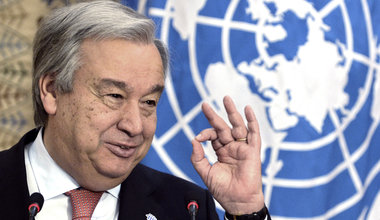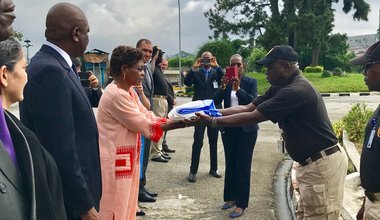UNOCI URGES JOURNALISTS TO CONTRIBUTE TO A SUCCESSFUL RESOLUTION OF THE CRISIS
Abidjan, 3 May 2010... Ivorian journalists, along with their counterparts the world over, on Monday, 3 May, celebrated the 19th World Press Freedom Day which focused on the theme: "The Ivorian Media: Achievements of the Last 50 Years and the Challenges Ahead."
The Spokesperson of the United Nations Operation in Cote d'Ivoire (UNOCI), Mr. Hamadoun Touré and two other panelists examined the topic on: "The Contribution of the Media to Democratic Governance in a Country in Crisis." He urged the journalists to work towards a successful resolution of the crisis and to master their subjects in other to make the public understand them better.
Mr. Touré said a journalist who is interested in good governance "must keenly observe how government action matches with the principles of transparency, equity, justice, the rule of law, etc". He stressed the need for journalists to know the difference between good and bad governance.
He noted that journalists were facing challenges, recalling that the Ivorian media were going through the trying period of the peace process. "They should be at the forefront of the relaunch of the electoral appeals process and preparations for elections," Mr. Touré stressed. "The first critic will be the reader who is expecting credible information to guide him during this sensitive period," he said.
Mr. Touré, who was also representing the entire UN system, recalled that World Press Freedom Day was introduced in 1993 by the United Nations General Assembly to reaffirm the right to freedom of expression and to condemn repressive governments throughout the world.
He reaffirmed the wish of the United Nations to see professional journalism, the pivot of freedom of expression and opinion, ensure the right to information for a successful resolution of the crisis within the perspective of sustainable development, while respecting ethical and deontological obligations.
In this context, he reviewed the activities of UNOCI aimed at promoting the media through the organization of workshops, training seminars and monitoring.
Besides Mr. Touré, two other experts made contributions to the panel discussion conducted by the president of the International Union of the Francophone Press (UPF), Alfred Dan Moussa and the secretary –general of the Ivorian National Commission of UNESCO, Professor Bamba Lou Mathieu.
Mr. Dan Moussa, for his part, insisted on two aspects, namely the respect for regulations and ethics and the education of the media. Professor Bamba Lou, laid emphasis on two UNESCO inter-governmental programmes for the benefit of the media.
Earlier, Messrs. Acka Felix, Zio Moussa and Kan Soufle respectively professor of law, president of the Observatory for press freedom, ethics and deontology, and cartoonist focused their discussion on the topic: "Media, the right to obtain and use images and the rights and obligations pertaining to the use of images".
At the end of the presentation of papers, participants exchanged views with the panelists on questions related to the themes. A declaration drawn up by the representatives of associations of journalists, publishers and media regulatory bodies was read out and unanimously approved. Several public activities were organized under the auspices of UNOCI in the provincial towns on the global theme: "Information: The Right to Know".
The opening ceremony was presided over by the Minister of Communication, Ibrahim Sy Savane, who stressed on professionalism as the guiding principle of all journalistic work and a clear awareness of the national environment. He highlighted the relationship between democracy and freedom of the press and urged everyone to participate in the promotion of press freedom and emphasized the watchdog role of civil society.
He called on the journalists to use the occasion for individual stock-taking and to relate it to the various initiatives aimed at promoting the press. Mr. Savane drew attention to their responsibility: "The defense of the freedom of the press is a collective task". He concluded by noting the precarious nature of the journalism profession throughout the world which, he noted, tended to lower one's self–esteem."
 ONU
ONU Nations Unies Maintien de la paix
Nations Unies Maintien de la paix



